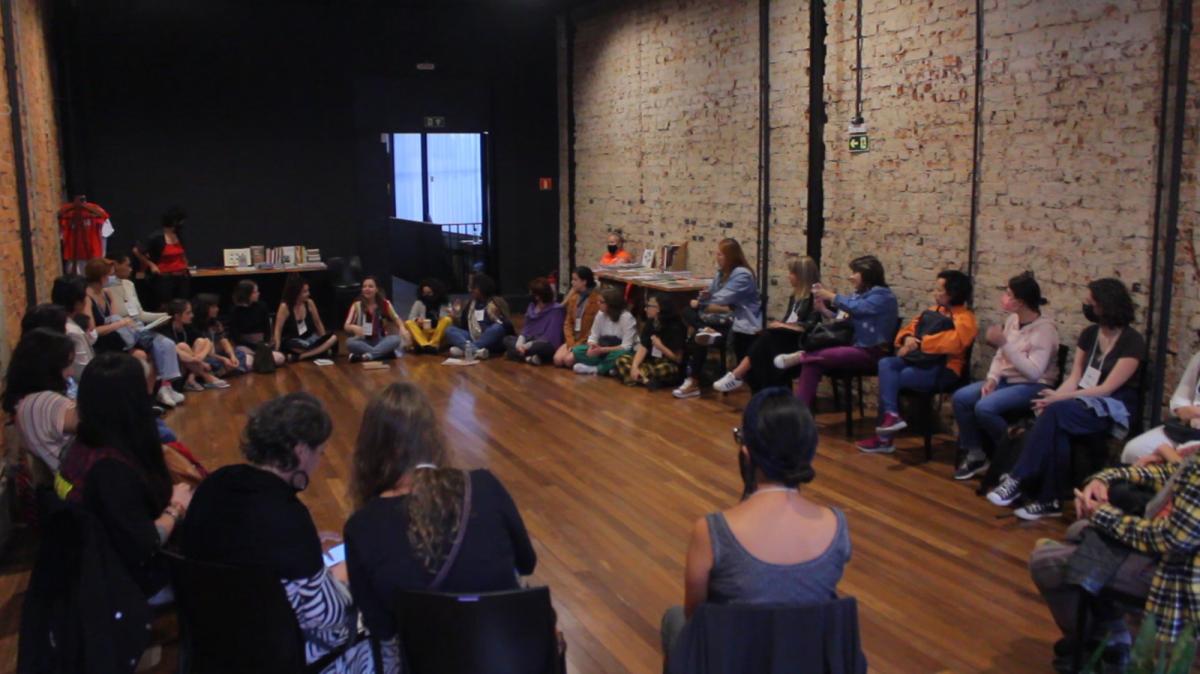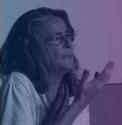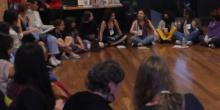Open Letter from Brazil to Europe
reflections from the Reverbe Meeting/2022
When you have read this letter, please click here to join the discussion.
Curitiba, Brazil, January 2023
We begin this letter seeking to open a dialogue on issues that have been latent for a long time, which to us can no longer be postponed. A dialogue about the differences and about uncomfortable and recurring situations that need to be reviewed, including within the Magdalena Network. In our first edition of the International Meeting of Women on Stage - Reverbe, in Curitiba, Brazil, racism happened and generated movements, such as the cancellation of a performance, the opening of a round and the writing of this collective letter.
We are all part of this great network of theatre women, which has existed for so many years called The Magdalena Project. In recent years the network has expanded greatly, especially in Latin America, bringing an immense variety of festivals in countries such as Brazil, Chile, Argentina, Peru, Colombia and Ecuador. This growth has enabled many exchanges, contributing to the maintenance of the network, which continues to multiply and update itself. Such festivals have also offered many invitations to European artists to share their works, visions and visit these countries. The richness generated by the meeting of cultures is undeniable and how much the network is strengthened precisely by this plurality.
However, some themes have been pulsating for some time and deserve a more focused and profound reflection to advance in what could be an international network of women in the performing arts, which have to do with references, worldviews and how to express ourselves in different contexts, respecting the place where we are. This letter is an invitation to open up possible spaces for (re)existence.
In order to do so, it is important to contextualize where we are talking from. When the Portuguese invaded Brazilian territory in 1500, they found indigenous peoples of various ethnic groups here, with different cultures, behaviors and languages. They were welcomed, invited in. Eventually, the newcomers either exterminated or enslaved them all. Flávia Lisbôa, a professor at the Federal University of South and Southeast Pará (UNIFESSPA) points out "It is important not to lose sight of the fact that European domination is an imperial action to expand its territorial domains, the seizure of the territory today called Brazil was nothing more than the theft of indigenous territories, imputing to the natives the condition of enemies of war, a people “conquered” through extinction/annihilation from 1500 onwards and which has never ceased, with the exception of the refinements that occurred in the way genocide is perpetuated today.” (2020)
Later they kidnapped and brought here by force for approximately 300 years, African nations to work in the rich Brazilian lands. Indigenous peoples, Africans and white invaders constitute the essence of the Brazilian people, the so-called miscegenation, built by violence and a political project to whiten the Brazilian people. To this day the majority of the black population is in the peripheries, constituting the poorest layer of the country. In the words of the important Brazilian thinker Lélia Gonzalez, "Latin American racism is sophisticated enough to keep blacks and Indians as subordinate segments within the most exploited classes, thanks to its most effective ideological form: the ideology of whitening. with mass communication and traditional ideological apparatuses, it reproduces and perpetuates the belief that the classifications and values of the white West are the only true and universal ones. Once established, the myth of white superiority demonstrates its effectiveness through the effects of shattering, of fragmentation of racial identity that it produces: the desire to whiten is internalized, with the simultaneous denial of race itself, of culture itself" (GONZALEZ, 1988, p. 73).
Some teachers, aware of their role as educators, are proposing narratives more coherent in relation to the process of colonization in our country, but even today, in many Brazilian schools, they teach about the "discovery" of Brazil, instead of talking about invasion and genocide. How is this historical period taught in Europe? What is taught about this great European continent that "conquered" a large part of the world? And what do they teach in European schools about Latin America?
The invasion of 1500 may seem a long way off, however, remnants of colonial thought are everywhere, in the structure of societies. There is a deep root that is in the thinking and attitude of all of us until today, which is revealed in prejudiced and careless comments, offensive associations, impatience with differences, disdain in relation to other cultures, as for example when talking about the "Suffering of Latin America", without a reflection of where this crying comes from. One must consider a history of much suffering in fact, constructed, imposed, repeated and reproduced today in more refined and camouflaged ways, in this relationship between oppressors and oppressed, colonizers and colonized. These are situations that often go unnoticed, because they are veiled by a system that guarantees the maintenance of white privilege and European and American hegemony. In addition, it is very common that, when the oppressive content of a speech is detected, there is a refusal to recognize this aggression, an avoidance of self-reflection, of listening and reviewing oneself. And there's the point: the unrecognition of the bubble in which we are involved according to our reality and privileges, and how harmful it can be to let a racist, prejudiced attitude pass, or "forgetting" a comment that may have been made without any intention of evil, but that reinforces and perpetuates a model of society that we no longer want, and that hurts people so much. Our good intentions are for nothing.
As theater women, we have the opportunity to reverberate something different and deconstruct the structural racism from which we are all descendants, because the world wants and needs to change.
Today in Brazil, racism is finally a crime (Law 7,716). Prisonable. It's not drama. It's not silly. It's no joke. It's not an exaggeration. It's a crime. This achievement reflects an urgent need to rethink the values of a country that was built on the suffering of many.
The reflection that seems important to us to address here, is that when we are in territory other than our own, we have to be aware of where we are stepping and also put ourselves in a position of learning and listening. We know that similar situations happened in many Magdalena festivals around the world, not just in Brazil.
This letter is an action to address issues that are veiled and rooted in our cultures in different ways. We should feel safe within the network, with support, and sense of community, but there is a lot of work to be done here too, and not everyone feels this welcome and protection. There is much to look at in depth and we cannot allow the network itself to mirror this world that we persistently fight to change.
We need to be vigilant and address the subject without fear and without censorship, so that we can take a small step forward and, in fact, include every woman. What at one time was normal to say, to do, is no longer acceptable today. Without transformation there is no continuity and we can no longer postpone this historical review/reparation. What for one may seem like drama or a joke, for another is recreational racism* and a matter of struggle, resistance and physical, mental and emotional survival.
This letter is also an invitation to talk, to meetings where we can openly discuss these issues, listen to each other and walk together. We invite you to join the debate on this forum on the Magdalena Project website (instructions for how to participate are on the forum). We continue reverberating what happened here, with the hope that the "ripple effect" of this letter will contribute to the transformation of a world we yearn to create and live within.
Signed by
Janaina Matter, Greice Barros, Naná Sodré, Stela Fisher, Juliana Capilé, Tatiana Horevicht
*Term used by Doctor Adilson Moreira that refers to “jokes” that, apparently, are harmless, but that have a racial nature in which they associate physical and cultural characteristics, of black or indigenous people as inferior or unpleasant. Comments made with "good intention".
References:
in English:
- Kimberlé Crenshaw, "Race, Gender, Inequality and Intersectionality": https://www.youtube.com/watch?v=KNKbGFoYC1Q
-
Lélia Gonzalez, Racism and sexism in Brazilian culture, 1984
About her with English subtitles: https://www.youtube.com/watch?v=lX-kDLOo-6A - Flávia Marinho Lisbôa, artigo: O Genocídio indígena desde 1500 e a resistência por meio da universidade, 2020 https://anpoll.org.br/enanpoll-2020-anais/resumos/digitados/0001/PPT-eposter-trab-aceito-1566-1.pdf
- Adilson Moreira, Racismo Recreativo, 2019, Coleção Feminismos Plurais

Reverbe 2022. Photo: Eli Firmeza






